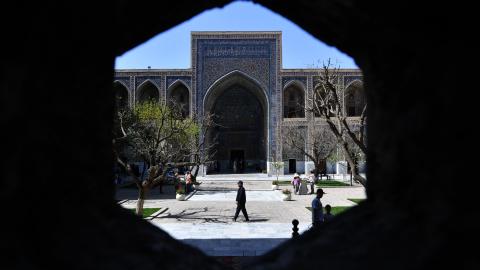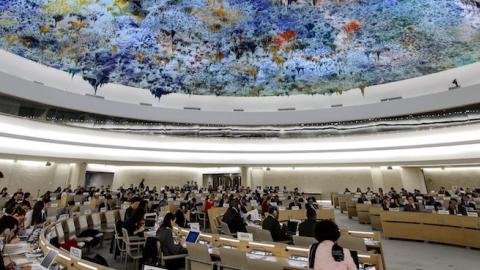The UK’s statement on Friday, calling out the United Nations Human Rights Council (UNHRC) for its “disproportionate focus on Israel” was an uncharacteristically forceful and public statement of truth on the issue.
It slammed “Agenda Item 7”, the structural, institutionalised mechanism singling out Israel at the Council.
Human rights in every other country are debated under “Agenda Item 4”; only Israel has an entire agenda item of its own. The result, noted Britain’s Ambassador Julian Braithwaite, is that of 135 country-specific resolutions adopted by the Council, 68 have targeted Israel.
This partly explains why in the past decade, although more than 300,000 civilians have been killed in Sudan, 55,000 children killed in Syria and more than 3,000 people executed in Iran, Israel has received more condemnation than those countries combined.
The UK did vote for two of the five resolutions against Israel and abstained on two more, which is not ideal. But whether prompted by the FCO or by Downing Street, it decided there must be limits to the Council’s hypocrisy, duplicity and dishonesty.
Britain broke ranks with the other European members and voted against a resolution regarding Israel and the Golan Heights. “We cannot accept the perverse message sent out by a Syria Golan resolution that singles out Israel, as Assad continues to slaughter the Syrian people,” said Braithwaite.
He also condemned the Council’s failure to address terrorism and incitement against Israel, citing 250 recent terrorist attacks that have killed at least 30 Israelis, and was all the more powerful coming two days after the car ramming and stabbing attack in Westminster.
The statement offered hope that the UK, which joined the Council last year, will not pander to the anti-Israel farce but show leadership in challenging it. Other European countries should follow suit. For too long they have sided with the dictatorships who dominate the Council, like Saudi Arabia, Venezuela and Iraq, rather than standing up for fairness, justice and democratic values.
When the UK “put the Human Rights Council on notice” it was the latest indication that change is stirring. Good news from the UN is rarer than buses but in the space of a week, three positive developments came along at once.
A week earlier, Rima Khalaf, Executive Secretary of the UN Economic and Social Commission for Western Asia, resigned. I was the first to call for her dismissal in 2014 after she published a report comparing Israel to the Nazis. This year, her report slandered Israel as an “apartheid state.”
New Secretary-General Antonio Guterres demanded she withdraw it, prompting her resignation. Khalaf’s reports, which rewrote and distorted history, have been consigned to the dustbin of it.
Then last Monday, building on the leadership shown by new American UN ambassador Nikki Haley, the US refused to participate in a UNHRC debate on the Middle East, also condemning Agenda Item 7.
Guterres and Haley can’t change the system on their own, but on Friday, Britain showed it too can play a leading role, if it chooses, in restoring credibility to international institutions. That’s not just in Israel’s interests, but in the interests of all who want international institutions that are credible, fair and fit for purpose.
Israel’s friends and supporters in the UK should also grasp this historic opportunity to campaign for change. The bias in UN institutions is not about this or that Israeli policy. It is structural, institutionalised discrimination against the Jewish state.
To understand the difference between legitimate criticism of Israel and the anti-Semitic demonisation of it, there is no clearer marker than Agenda Item 7.
Where ever you sit on the political spectrum, now is the time to make your voices heard, write to your MPs and encourage the UK to build on last Friday’s principled stance.
Together, let’s call clearly and directly: Agenda Item 7 must be scrapped.



















